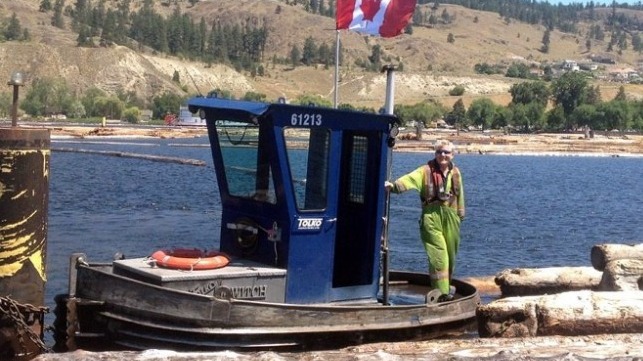Report: Open Hatch and Alcohol Contributed to Fatal Tug Accident

WorkSafeBC, British Columbia's workplace safety regulator, has concluded its investigation into a fatal tug accident at a sawmill on Okanagan Lake in 2017. The agency found that an engine compartment hatch was unsecured, the victim was using a non-functioning inflatable life vest and that alcohol was present on board the vessel.
On the night of Jan. 30, 2017, mill worker Ivor Lundin was operating a boom boat - a small tug designed to move whole logs - at the Tolko Industries sawmill on Okanagan Lake. The vessel capsized in about 10 feet of water, and Lundin was unable to escape. Rescue workers located the vessel and his body at about 0200 hours the following morning.
According to WorkSafeBC, the hatch to the boom boat's engine compartment was not fully secured, raising the possibility that the boat could flood rapidly.
“The exact circumstances surrounding the sinking of this boat are unknown because the incident was not witnessed. However, given the information that is available and the nature of this work, it is logical to conclude that the boat was swamped by water that rapidly filled the engine compartment, causing the boat to sink quickly," WorkSafeBC concluded. "Swamping could occur if the front of the boat was driven underwater as a result of a collision with an object (such as a bundle of logs) or from pushing a bundle of logs.”
Once the vessel went down, Lundin's life jacket would not have helped him, WorkSafeBC asserted. First, its design was neither inherently buoyant nor automatically inflatable, making it unsuitable for the work environment. Second, if Lundin had attempted to activate it manually, it would not have gone off: the pull cord for the inflator was improperly routed, "rendering the PFD inoperative."
In addition, investigators found a "partially full" bottle of liquor inside of a backpack on board the boat. Testing of the contents found that the liquid was approximately 40 percent alcohol. Based on its investigation, WorkSafeBC asserted that the mill operator did not fully implement its alcohol testing regime, and said that this may have been a contributing factor.
The agency cited Tolko for two violations: failing to ensure the health and safety of its workers, and failing to provide its boom boat operators with the right kind of life vests. The firm has since issued self-inflating vests.
